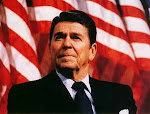Sphere: Related Content
 American Enterprise Institute resident scholar and one of the major architects of the current Iraq surge Fred Kagan has written a a lengthy piece for NRO Why Iraq Matters, Talking back to anti-war party talking points.
American Enterprise Institute resident scholar and one of the major architects of the current Iraq surge Fred Kagan has written a a lengthy piece for NRO Why Iraq Matters, Talking back to anti-war party talking points.
It's probably a good thing that moonbats everywhere already see him as Rudolph Hess to Bush's Hitler as Kagan apologetically faces down many of the anti-war Left's arguments against the Iraq war and this article would certainly put a bullseye on his forehead, if it weren't already permanently affixed there by the Moveon.org Left.
He comes out of the gate, both guns blazing and letting the war's opponents know that their ever-changing reasons for pulling out would have real world ramifications:
Yes, in the world as it is, whatever line we sell ourselves, there really is victory and there really is defeat, the two are different, and their effects on the future diverge profoundly. And yes, the reason we must continue to spend money and the lives of the very best Americans in that far-off land is that the interests of every American are actually at stake.
He makes no effort to disguise his distaste for the Left's cynicism.
The antiwar party rather gleefully seized upon recent Iraqi Security Forces operations against Sadr’s militia and other illegal gangs as proof of this — the general glee with which the antiwar party has greeted any setback in Iraq is extremely distasteful and unseemly, whatever domestic political benefits they believe they will receive from those setbacks.
And then he begins to dismantle their arguments. He dispatches the "
The War Cost Too Much" mantra by comparing Iraq War costs with the costs of previous wars.
Military spending in World War II ranged from 17.8 percent of GDP to 37.5 percent; in Korea from 5.0 percent (in 1950 — 7.4 percent in 1951) to 14.2 percent; in Vietnam from 7.4 percent to 9.4 percent. Current expenditures on the Iraq and Afghanistan Wars bring total defense expenditures to something well below 5 percent of GDP. Even granting the simplistic and misleading $3 trillion figure, $3 trillion is about 5 percent of the nearly $60 trillion American GDP over the five years of the war.
He also deals with the related complaint that "
The war has caused the upcoming recession" with ease as well.
Defense spending as a percentage of total federal spending is now around 20 percent. In World War II, it ranged from 73 percent to 89.5 percent; in Korea it ranged from 32.2 percent (1950 — 51.8 percent in 1951) to 69.5 percent; and in Vietnam from 42.8 percent to 46 percent. In more context: at the height of spending on this war, defense spending was only 12.3 percent of all public spending (including federal, state, and local expenditures); in World War II the high was 82.1 percent; in Korea, 52.5 percent; and in Vietnam 31.3 percent.
And he puts the lie to the assertion that
"High gas prices are the result of the war — and ending the war would lower gas prices."Oil prices do not rise because American forces are in the Middle East — they rise because of instability and fighting in the Middle East. One of the most dramatic increases in oil prices in history occurred during the Iran-Iraq War in the 1980s, when no American forces were present.
One of the arguments that I've always found to be most insincere coming from the Left is their programmed, "We're spending money on X "
that would otherwise be spent on more important domestic programs. "In the real world, there is no way that even a Democratic Congress would spend $100 billion a year in non-offset emergency authorizations for education or health care, even if some war critics think that they would like it to do so. As for increasing domestic spending, those who believe that we should raise taxes and spend more money on domestic programs can still advocate that policy, whatever its wisdom. This isn’t an argument about the cost of the war — it’s an argument about whether we want to have higher taxes to pay for increased domestic spending.
He goes on and on like this, puncturing holes in the Left's varied arguments, revealing them to be the political showthings that most of them are rather than thoughtful, reasoned arguments. The only area in which I think his argument goes weak is in addressing the Arab World's readiness for democracy. He holds up various modern states and populations as examples of how well Muslims can function under democratic rule. There are problems with all of his examples. Indonesia is hardly an example of a stable, long-lived democracy. Any discussion of Muslims in Europe being an example of how easily they can adapt to Western-style democratic ideals just doesn't pass the sniff test. If Kagan were to visit some of the Parisian suburbs or London's mosques he might rethink using these as examples of how ready Muslims are to enter the "Free World". The one example he gives that might have some legs is Turkey, but there are stresses in that country too that might yet cause Kagan to reconsider his confidence.
Of all the arguments the Left uses to attack the war, the above may be their best and seems to demand more attention than the President's "All men yearn for freedom" talk indicates that it is getting. But this argument would change the whole complexion of the Left's anti-war rationales, requiring a good faith effort to develop strategies to assist the Muslim World to reform itself into a more modern form. The Left doesn't want that. They want George W. Bush destroyed. They want him to lose and if it means (as of course it would) that America loses too, that's fine with them.
Kagan points out why their arguments are as insubstantial as their motivations. His article is well worth reading.
 Forget the whole Tibet/China thing; there a real reason to put out the Olympic torch: to save the Earth.
Forget the whole Tibet/China thing; there a real reason to put out the Olympic torch: to save the Earth.


















